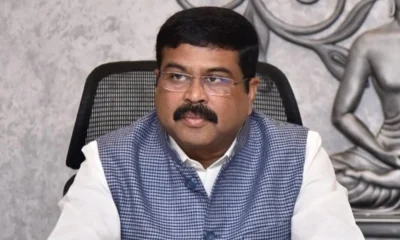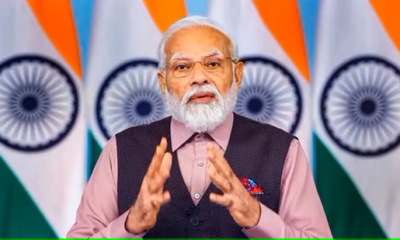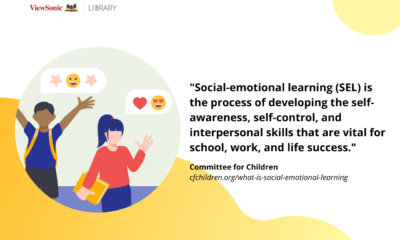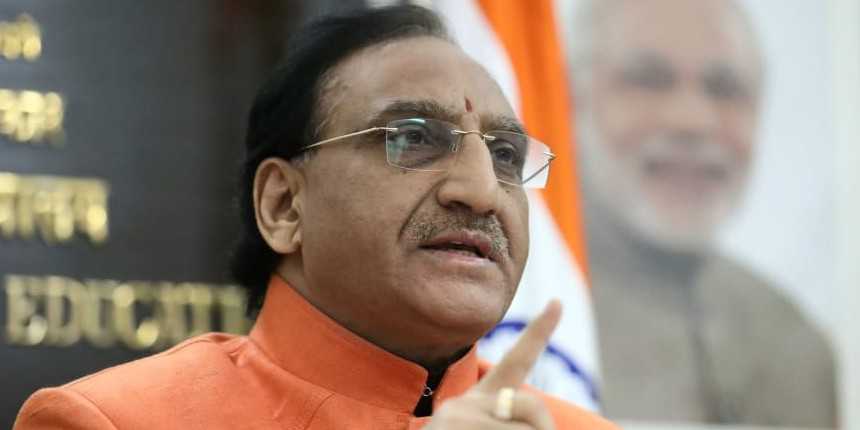Education
Dear Govt, Please Don’t Ignore The Youngest Citizens Of India: Early Childhood Association
Early Childhood Association strongly appeals to all State Government’s Women and Child Development and HRD ministry.
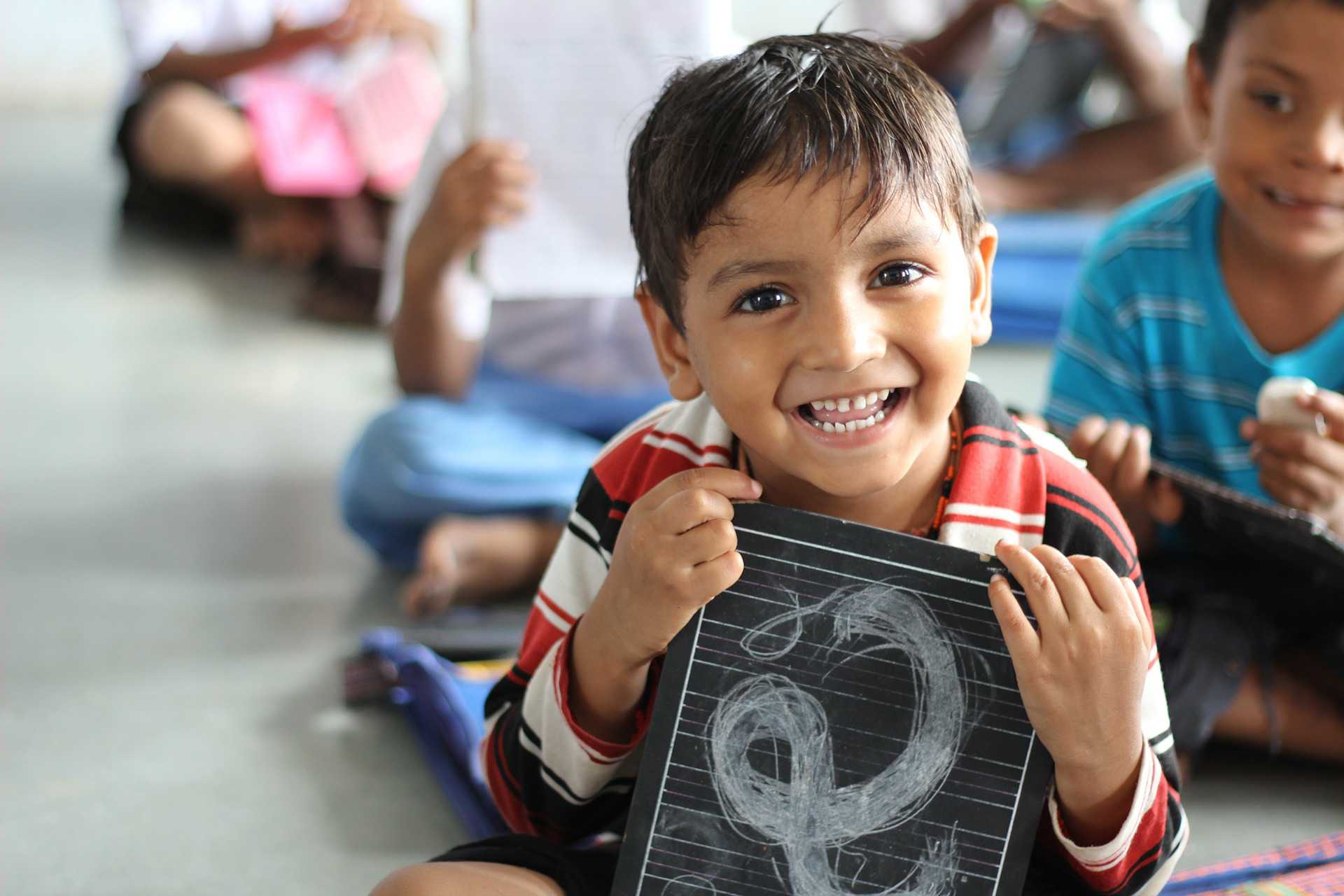
Early Childhood Association India strongly appeals to the Ministry of Women and Child Development and the HRD Ministry to not ignore the country's youngest citizens during the COVID-19 pandemic.
“We are guilty of many errors and many faults, but our worse crime is abandoning the children, neglecting the fountain of life. Many of the things we need can wait. The child cannot. Right now is the time his/her bones have been formed, his/her blood is being made, and his/her senses are being developed. To him/ her we cannot answer ‘Tomorrow’, his/her name is today”, said Gabriela Mistra, the Chilean poet-diplomat, educator and feminist.
This quote perfectly surmises the need of the hour in terms of Early Childhood Education and this letter is an attempt to find a solution and bring clarity on the raging confusion today, among parents, schools and policymakers, regarding lockdown and post-COVID planning for our young children and about the necessity of ensuring that young children stay connected to their preschools and Anganwadis even if remotely.
Preschools and Anganwadis are closed. Children are missing out on their inoculations, their one mid-day meal, their nurturing and stimulation that they receive with activities like singing, dancing, physical development and socio-emotional skills. We can understand that children below the age of 10 should be kept safe at home but why are we trying to keep them away from all the activities that they thrive on? Parents are busy at home with dual responsibilities- working and taking care of the home, as there is no support staff now. How much time do you think they would be able to give to the young child? Children are watching all kinds of inappropriate content on television and mobile phones.
Our National ECCE Policy conforms to the vision of holistic and integrated development of the child with a focus on care and early learning at each sub-stage of the development continuum in order to support the all-round and holistic development of children. The policy recognizes that young children are the best care for their family environment but in a country of widespread diversity and stratification, many families need supportive measures for the optimal development of the child, especially during this Covid-19 pandemic.
Let us now throw away the baby with the bathwater, just because a few schools made a mistake of copying what is done for older children and using it for younger children without thinking of its consequences. It is important that young children of our country get their cognitive, social, emotional and language stimulation that they require. It is not always easy or possible for parents today to provide the same, due to many issues like living alone, struggling with too many responsibilities and the new fear of Corona.
In this scenario if there is an edutainment program on television for children or if the preschools or Balwadis arrange for a video chat with the children and engage them in age-appropriate activities it would have a positive impact on the mental health of the children and would be a support to the parents too.
Neuroscience has proven that 90% of the brain develops in the first five years of life. What does that mean? It means it’s the first five years that lay the foundation for life and Children go through a period of rapid learning in the first five years. Our children since the last two months and for the next six months will be cooped up at home with very little stimulation. Their brains are making new connections that will one day become the blueprint for their life. And during this period, if they don’t receive the right kind of care or learning, they will grow up with a few life and learning deficits….and that is something that we need to work together to avoid.
Every year, the Annual Status of Education Report highlights abysmal student learning outcomes in primary schools in rural India. The root cause of this is the lack of quality of Early Years Education. When our entire Early Years' population will not attend preschools and Anganwadis for a whole year, can you imagine the impact on their mental, physical and cognitive health? We are depriving them of a ‘head start’ in life and learning.
Today we are planning for every sector..except the early childhood sector. We say, “children are the future” – and that’s true – but there’s a fundamental problem with that idea. It suggests that… they’re just kids now, but later, when they become the future, we can start taking care of them…with a better economy, a better job climate. But that’s wrong. Their brain development is happening NOW. The most embedded parts of their personality – their attitudes and moral values, their emotional tendencies, their learning abilities, how they will deal with people, how they will deal with situations, good or bad – they are all a product of experiences that our young children will receive now…during this Covid-19 pandemic. Its time that policymakers and government officials realise that we cannot let the foundation of our future be deprived of the required stimulation and connection that they were receiving from their preschools or Anganwadis.
Early Childhood Association strongly recommends that preschools and Anganwadis should use a developmentally appropriate and healthy way of connecting every day with the young children. Sing songs, narrate stories, play games, teach yoga, laugh, exchange smiles, count objects, name colours, guess letters and so much more can be achieved through just one hour of ‘face-time’ on a video chat platform.
Early Childhood Association strongly recommends that the connection between the teacher and the child should continue even during the lockdown and till preschools or day-cares open. This is important because teachers can convey many messages and educate them about:
- Eating healthy.
- Sleeping well.
- Not watching too much TV, or watching inappropriate videos or games on mobile phones.
- Help them understand and dispel the fear of Corona.
Teachers can help engage children in socio-emotional and physical activities:
- By helping them video chat with their peers.
- By telling them stories
- By singing rhymes
- By engaging them in doing yoga activities
- By teaching them through stories developed by ECA about physical distancing, wearing masks and new hygiene rules
- Teachers can play games like guess the sound; whose makes this sound etc.
An engaging video chat like this, for an hour every day, is not harmful to children.
(Ref: Website kids health medical experts- Time spent with screens (like a TV, tablet, or smartphone) can be an opportunity to reinforce learning and promote creative play) Even the American Academy of Paediatricians and W.H.O recommends introducing only “high-quality programming” to children 18 to 24 months of age. Children between the ages of 2 to 5 years should watch only one hour per day of approved programming.
Early Childhood Association urges all state governments to please ensure that our ‘littlest citizens’ are kept actively engaged through ‘face-time’ video chats by their preschools or Anganwadis. This one hour of video chat with the children by a trained teacher will achieve and contribute immensely to the foundation of life and learning of our young children. We also recommend that the preschools and Anganwadis must also involve the parents by sending them activities that they can do to spend quality time with their children during these stressful times of the Covid-19 pandemic. These activities should not be academic or stressful in any manner but should be supporting parents to tell stories, talk to their child, bond with their child and ensure that the child’s brain is not deprived of the most essential, ‘serve and return’ interactions, crucial for brain development.
Early Childhood Association further recommends to preschools and day-cares to give the home-school connection in three parts:
- Teacher: child connection- through ‘face-time’ video chats.
- Parent-child interaction: give activities that parents can do with their children again ensure no stress on academics. They can be fun videos to watch together on phonics or numbers or games and activities.
- Child independent activities: give yoga, home chores and activities that children can do with minimal help
Early Childhood Association is absolutely against a formal, teaching for early years on any remote learning platforms. This is not the time to stress on academics, academic achievement or assessing children academically. The focus should be on talking to children about topics that help nurture their thinking skills, emotional skills and social skills. But the connection with children should continue…even if remotely.
This kind of engagement will also keep teachers actively engaged and partner with parents.
The Early Childhood sector needs to be taken seriously if we want to come out of this pandemic with happy, resilient children and a robust economy. These video chat engagements are helping children be happy, keeping the teachers employed is contributing to the economical revival of the country. If thousands of preschools around the country close down, it will mean millions of jobs lost of teachers and will lead to economic chaos in many households.
Also attached are Safety Guidelines prepared by the Early Childhood Association for the reopening of preschools and day-cares.
“Sab bachcho ka bhala… desh ka vikas”.During this pandemic, let us not ignore our future, our littlest citizens.
Sincerely,
Dr. Swati Popat Vats
President
On behalf of
ECA National Committee
www.eca-india.org
Education
What the Indian Army Teaches Our Children Beyond Textbooks
By viewing the Indian Army as a living classroom, I see that true leadership stems from selfless service and integrity, not authority. To me, discipline is freedom—the capacity to make ethical choices and remain resilient under pressure. By fostering teamwork and active patriotism through simple, honest deeds, I believe education can transcend academics. My goal is to develop compassionate, self-confident citizens who view challenges as growth and contribute meaningfully to our nation.
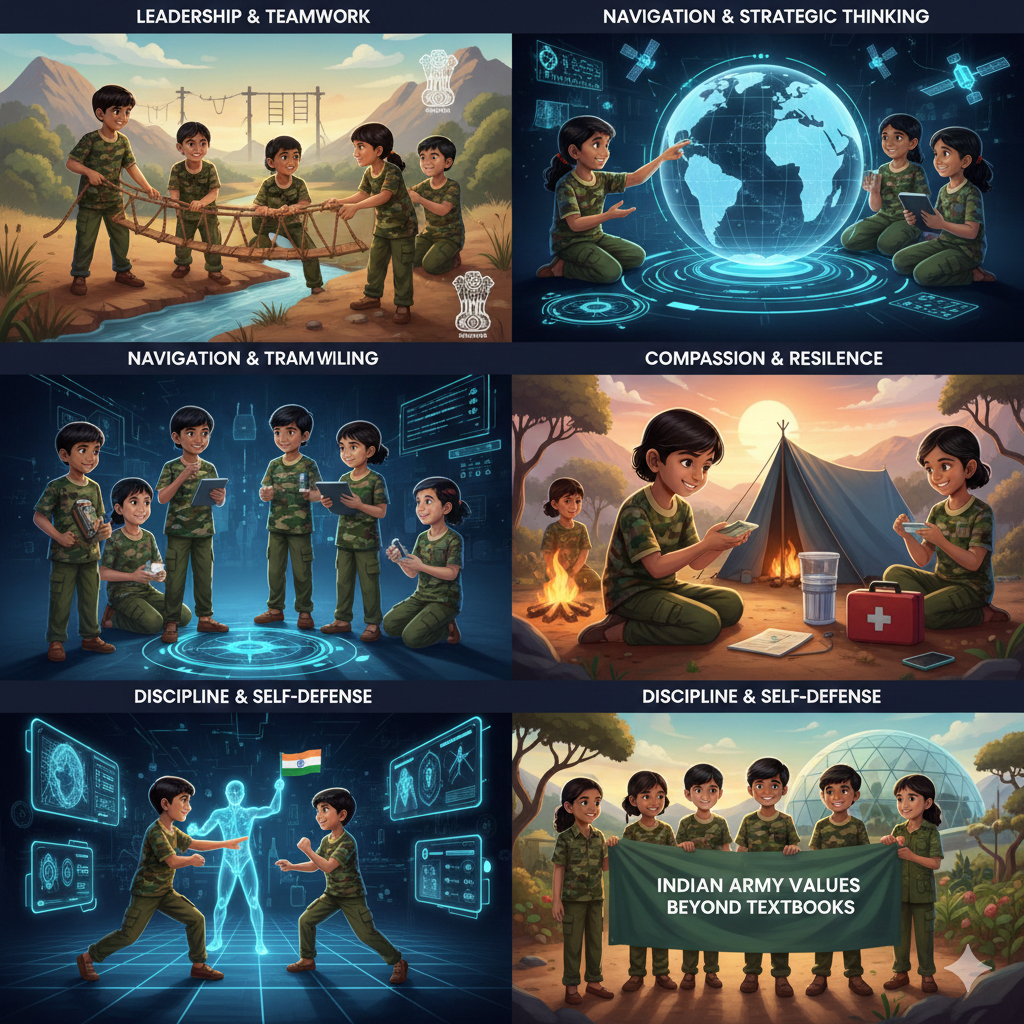
Real-world values will shape the way students see the world around them and what they value most; such as, the Indian Army serves as a living classroom, teaching students leadership, courage, and selflessness through action. Through the actions of each soldier, a student learns that the most important form of leadership comes from being committed to a purpose that is larger than themselves; that leadership is not defined by one’s authority, but rather by the way each individual serves others, holds to their integrity and is steadfast during the most difficult of times.
Discipline is one of the Army’s greatest lessons, but it is also frequently misinterpreted as control. In reality, discipline is a means to provide freedom: freedom to make ethical decisions, act responsibly, and focus when stressed. This lesson of discipline is an essential lesson for children and will help children achieve their true potential through the routines built to help them grow to become trustworthy individuals.
As soldiers, children acquire many skills and knowledge that help them cope with difficult situations and disappointments. They learn how to work together, trust and support each other And recover from their mistakes. All these lessons work together to help a student learn that disappointment is only a step/stage in life; not the finish line. Whether it be in the classroom or on the playground: teaching children emotional strength, working as part of a team and persevering will prepare children not only for the next exam but for life itself.
Patriotism is an action rather than a word. The example of the Indian Army teaches children that love of nation is shown by simple deeds such as being honest, respectful, disciplined and responsible towards one’s community. Schools can make patriotism a part of daily experience instead of just talking about it.
Education needs to model itself after the Indian Army, if it wants to develop citizens who contribute meaningfully to society, and not just create scholarly students. Schools should develop students into people who are self-confident, compassionate, disciplined, generous, strong in values, and are future leaders that support the growth of their country through their successes.
“Discipline and united action are the real source of strength for a nation.” — Field Marshal Sam Manekshaw
About the Author:
Ms. Sonal Sharma is the Principal, Birla Open Minds International School, Yavatmal . She is passionate about empowering both educators and learners by creating engaging, impactful, and innovative training experiences.
Education
AI to Become a Core Subject from Class 3: India’s Big Leap Toward a Future-Ready Generation

In a landmark move to make India’s school system future-ready, the Department of School Education & Literacy (DoSE&L), Ministry of Education, has announced that Artificial Intelligence (AI) and Computational Thinking (CT) will be introduced as part of the school curriculum from Class 3 onwards, beginning in the academic year 2026–27.
The initiative marks a major step in preparing students for an AI-driven world, ensuring early exposure to technological literacy, ethics, and problem-solving. The curriculum, currently being developed through a consultative process with CBSE, NCERT, KVS, NVS, and States/UTs, will fall under the National Curriculum Framework for School Education (NCF-SE) 2023, in alignment with the National Education Policy (NEP) 2020.
A stakeholder consultation held on 29th October 2025 brought together education leaders, including Prof. Karthik Raman from IIT Madras, who heads the CBSE expert committee responsible for shaping the AI & CT curriculum. The focus is on designing a meaningful, inclusive framework that integrates AI not as an advanced elective but as a foundational skill — comparable to literacy and numeracy in importance.
Shri Sanjay Kumar, Secretary, DoSE&L, emphasised that AI education should be viewed as a universal skill closely linked to real-world applications. “Every child’s distinct potential is our priority. Policymakers must define minimum thresholds and evolve them with changing needs,” he said. He also stressed on teacher training as the backbone of successful implementation, with modules under NISHTHA, and resource materials being prepared by NCERT and CBSE.
The Ministry plans to release AI handbooks and digital resources by December 2025, followed by a grade-specific rollout supported by video-based learning materials and structured training.
By embedding AI education from the foundational years, India aims to nurture a generation that understands, creates, and applies technology ethically — transforming the vision of AI for Public Good into everyday classroom reality.
Education
Dharav Utsav to Celebrate Rajasthan’s Cultural Heritage and Local Talent

Education
How to Build Better Parent-Teacher Communication

Good communication between parents and teachers plays an important role in a child’s learning and confidence. When both stay connected, it helps students feel encouraged and understood. Still, it’s not always easy to keep that connection strong. Busy schedules and small misunderstandings can make things tricky. The good news is that a few simple habits can make a real difference. Let’s examine what parent-teacher communication truly entails and how both parties can collaborate more effectively.
What is Teacher and Parent Communication?
Teacher and parent communication is all about staying connected and working together for a child’s growth. It’s not just a one-time meeting or message but a continuous, two-way exchange of updates, ideas, and feedback. When teachers and families stay in touch regularly, it creates a strong support system that helps students do better both in and outside the classroom.
In simple terms, teachers share what’s happening at school, like:
- Homework and assignments
- Grades and test results
- Class activities and behavior updates
- Social and emotional progress
- Strengths and areas where a student might need extra help
At the same time, parents share what’s happening at home, such as:
- How the child feels about schoolwork
- Any challenges or changes they’ve noticed
- Questions or suggestions about learning support
When both sides keep the communication open, it builds trust and teamwork. Teachers understand students better, and parents feel more involved in their child’s education.
Tips for Smooth Parent-Teacher Communication
Talking to parents doesn’t have to feel formal or uncomfortable. In fact, the better your connection with them, the smoother your teaching journey becomes. Whether you’re reaching out for the first time or trying to keep the conversation going, here are some real-world ways to build trust and keep communication easy, clear, and helpful.
1. Begin with a Friendly Introduction
Right at the beginning of the academic year, take a moment to introduce yourself to parents. You can send a friendly email, a printed note, or even a short video message. Let them know who you are, what you’re excited about, and how they can reach you. This early step breaks the ice and helps parents feel welcome and included in their child’s learning journey. When you set a positive tone early, it makes future communication easier and more comfortable for everyone.
2. Communicate Often, Not Just When There’s a Problem
Don’t let communication only happen during parent-teacher conferences or when something goes wrong. Send regular updates about what’s happening in class, upcoming events, or even small successes their child has had during the week. These don’t need to be long messages. A quick note about a student’s progress or behavior can make a parent’s day and help build trust over time. It also shows that you’re not just reaching out when there’s a problem.
3. Invite Their Voice, Too
Sometimes we forget that parents know their child better than anyone else. Ask questions. How does their child learn best at home? Are there any routines or challenges you should know about? And when they speak, listen fully. These conversations often reveal things that can shape how you teach and connect with the student.
4. Be Available and Approachable
Parents need to know that they can come to you when something is on their mind. That doesn’t mean being available 24/7, but it does mean creating space for honest conversations. You can let them know about your preferred times for calls or meetings, and also offer virtual options if in-person isn’t possible. Make sure the tone of your communication is always warm and non-judgmental so they feel safe speaking up.
5. Treat Parents as Team Members, Not Outsiders
Instead of just delivering information, try to involve parents as partners in their child’s learning. Share ideas for how they can help at home, ask for their observations, and thank them for their efforts. If there’s a behaviour issue or academic challenge, work with them on solutions instead of just reporting the problem. A strong home-school partnership creates a consistent support system for the student, both inside and outside the classroom.
6. Show Cultural Awareness and Respect
Families come from many different backgrounds, and their expectations may vary. Take the time to learn about their culture, language preferences, and family structure. Avoid making assumptions or using language that might feel exclusive. If needed, provide translations or simplify your communication to make sure everyone understands. This small effort shows parents that you value who they are and where they come from.
7. Share Progress in a Way That’s Clear and Supportive
Progress updates should be balanced. Yes, it’s important to point out what’s not working, but don’t forget to highlight what is. Give specific examples instead of vague praise or criticism. Say things like, “I’ve noticed Priya really lights up during science experiments,” or “Rohan is still working on staying focused during group tasks.” This kind of feedback feels personal and helps parents understand the full picture.
8. Choose the Right Tools for the Right Message
Too many apps or tools can overwhelm parents quickly. Choose one or two that you’ll stick to, whether it’s a school app, WhatsApp group, or weekly email. Use them for quick updates, reminders, or sharing student wins. Keep your tone casual but clear. Tech is helpful only when it makes life easier for both sides.
9. Respect Their Time and Yours
Teachers and parents are both juggling busy schedules. Respecting each other’s time helps keep communication productive and stress-free. If you’re scheduling meetings, offer time slots that work for working parents, too. Keep conversations focused so that meetings don’t run longer than necessary. Also, set clear boundaries about when you’re available.
When Is Parent-Teacher Communication Most Important?
Parent-teacher communication matters most right at the start of preschool. That first day of preschool is a big moment for every child and their family. When teachers and parents talk openly from day one, it helps everyone feel more comfortable and sets up a strong partnership for the rest of the year.
Why It Matters on Day One
- The first day of preschool often brings a mix of excitement and nervousness for both kids and parents. Honest communication helps everyone feel a little more comfortable.
- Open communication lets teachers learn about each child’s background, interests, and any worries or comforts. This way, teachers can give more personalized care and support from the beginning.
- Early conversations help build a sense of trust between home and school, making the classroom feel like a safe and welcoming place for the child.
- When teachers share classroom routines and expectations with parents on the first day, it helps families get ready and feel involved in their child’s new experience.
- These early talks also give teachers helpful details, like which languages are spoken at home, special family traditions, or any recent changes in the child’s life. This helps teachers communicate better and offer the right kind of support.
By making communication a priority from the very first day, both teachers and parents can work together to help each child settle in smoothly and feel confident as they start their schooling journey. Building strong parent-teacher teamwork not only supports a child’s emotional well-being but also lays the foundation for long-term academic success.
Closing Thoughts
We hope these tips help make your conversations with parents smoother and more meaningful. Building that connection takes time, but small efforts can lead to strong partnerships.
This article is authored by-
Chitra Khanna,
Content Strategist,
KLAY Preschools & Daycare
Education
Beyond the Syllabus: School Teachers’ Insights on Project-Based Learning

How classroom experiences are being reshaped through projects, inquiry, and authentic learning
As the classroom grows beyond the boundaries of textbooks and blackboards, so too does the role of the teacher, and the very meaning of learning. Project-Based Learning (PBL), once considered a niche innovation, is increasingly being embraced by educators across schools in India. But what happens when PBL moves from theory to practice?
To answer this, we turned to the people at the heart of the learning experience: teachers.
In conversations with educators from diverse school contexts, one theme was clear: PBL is not just a teaching strategy; it’s a transformation in how students learn, engage, and grow.
From Worksheets to Real-World Work: How PBL Differs from Traditional Homework
One of the clearest contrasts teachers observed was how PBL moves learning from repetition to relevance. Traditional homework often reinforces information through rote exercises. PBL, by contrast, asks students to apply their knowledge to solve problems, create products, or investigate issues that matter to them.
One teacher shared how using PBL to raise student awareness about water pollution was a hit in the class. Instead of just assigning problems, the students were made to create awareness posters, conduct surveys in their neighbourhood, and suggest solutions through group presentations. The teacher also noted how the students took the lead, and had an ownership over this project that they usually don’t showcase.
The shift from repetition to application fosters deeper engagement. Several teachers noted that students who previously struggled to stay motivated with homework showed renewed interest when asked to take on real-world challenges.
Changing Roles: Teachers as Facilitators, Not Just Instructors
Project-Based Learning also changes the role of the teacher, who went from being the sole source of knowledge to a guide who supports inquiry and exploration.
One common change teachers noticed was on how they had to let go of control in the classroom. Naturally, the students now had to work on projects on their own, and could only come to the teacher for guidance and help. The teachers noted that they helped their students ask the right questions, find credible sources, and evaluate their work, instead of completely placing the burden of learning on the teacher themselves.
This change isn’t always easy. It requires a shift in mindset and in many cases, rethinking how time is used in class. But most teachers agree: the shift is worth it. PBL has encouraged interdisciplinary approaches, made space for collaborative learning, and created more meaningful student-teacher interactions.
Unlocking Student Potential: What PBL Offers Beyond Academics
Academic performance remains important, but a lot of teachers repeatedly pointed out that PBL nurtures a broader set of skills, like critical thinking, collaboration, communication, and creativity. One teacher particularly noted on how their quietest students became ‘leaders’, and became outspoken when it came to presenting their ideas and projects. While not directly, PBL helped these students find their voices, and find confidence in their effort and abilities.
Students learn to manage time, negotiate roles, and solve problems, skills that aren’t always reflected in exam scores but are vital for life beyond school. For many teachers, the most rewarding aspect of PBL was watching students take initiative, work through failure, and reflect on their learning.
Widening the Circle: Strategies for Scaling PBL in More Classrooms
While the benefits are clear, teachers acknowledged that implementing PBL at a large scale comes with challenges, like limited time, rigid curriculum structures, and unfamiliarity among teachers.
They offered a few practical suggestions for schools and educators considering wider adoption:
- Start Small and Build Confidence: Starting with short projects aligned to the unit you are already teaching introduces PBL in an easy manner. This way, teachers do not have to worry about overhauling their curriculum, or for making huge changes to their current teaching methods.
- Encourage Collaboration Among Teachers: Joint planning across subjects makes projects richer and more integrated. This also promotes interdisciplinary skills among students, and allows them to craft solutions using different subjects and skillsets.
- Make Time for Reflection: Embedding opportunities for students to present, critique, and reflect helps solidify learning. By reflecting on their projects and mistakes, they can understand how they can improve their approach to PBL.
- Support Professional Development: Teachers emphasized the need for ongoing training, not just one-off workshops but long-term spaces for peer sharing and mentorship. This continuous development would cement and solidify the methods and outcomes that will maximise using PBL for student benefits
Looking Ahead: Redefining Success in Education
PBL challenges traditional ideas of what learning looks like. It pushes students to move beyond memorization, and it challenges teachers to rethink their methods. But more than anything, it opens up the classroom to ideas, to communities, and to possibilities. No longer are students just preparing for exams, but also for the complex world outside school.
As educators continue to navigate the changing landscape of education, the insights from teachers point us toward a hopeful future, where learning is meaningful, relevant, and rooted in real-world experience.
This article is authored by Mrs. Padmashini M Patro, Principal, Air Force School Bamrauli
Education
Over 1 Lakh Single-Teacher Schools Educate 33 Lakh Students Across India: MoE Data

Education
Over 3 Lakh Schools Join Hands for India’s Largest-Ever Innovation Challenge: Viksit Bharat Buildathon 2025

In a historic moment for Indian education, more than 3 lakh schools across the country came together to participate in the Viksit Bharat Buildathon (VBB) 2025, the largest live school innovation challenge ever organised in India. The nationwide event was inaugurated in New Delhi by Union Education Minister Dharmendra Pradhan, marking a significant milestone in the Government’s efforts to embed creativity, innovation, and problem-solving into the school ecosystem.
The Viksit Bharat Buildathon, organised by the Department of School Education & Literacy (DoSEL) in collaboration with Atal Innovation Mission (AIM), NITI Aayog, and AICTE, saw over one crore students from Classes 6 to 12 working simultaneously during a 120-minute live innovation session. Students teamed up in groups of three to five to design prototypes and propose solutions under four themes — Atmanirbhar Bharat, Swadeshi, Vocal for Local, and Samriddhi.
While inaugurating the event, Minister Pradhan interacted virtually with students of PM SHRI Government High School, Khorda, Odisha, and later visited Delhi Public School, Mathura Road, and Kendriya Vidyalaya No. 2, Delhi Cantt. Commending students for their creativity, he said, “The vision of Viksit Bharat will be realised through the innovative spirit of our young learners. These ideas will not only address domestic challenges but also create global models for change.”
The event drew widespread participation, with Uttar Pradesh leading the numbers (78,206 schools), followed by Maharashtra (41,198), Gujarat (20,017), and Madhya Pradesh (18,129). Other states like Tamil Nadu (16,370), Bihar (15,732), Odisha (12,344), and Haryana (11,567) also recorded impressive engagement, showing the growing momentum for grassroots innovation across regions. Even smaller territories like Ladakh (358), Puducherry (149), and Andaman & Nicobar Islands (171) participated actively, reflecting the nationwide reach of the initiative.
According to Sanjay Kumar, Secretary, DoSEL, this unprecedented participation signals a transformation in how Indian students approach learning. “This one-of-a-kind movement strengthens innovative thinking and enhances the problem-solving capabilities of students across India,” he said. Deepak Bagla, Mission Director of AIM, called the initiative a “mass movement connecting schools in remote villages with those in metropolitan cities through innovation.”
A New Chapter for Indian Education
The Viksit Bharat Buildathon signifies more than just a hackathon — it reflects a systemic shift in Indian education towards experiential and innovation-led learning. As schools across the country engage in design thinking, tinkering, and collaboration, students are being equipped not just with knowledge, but with the mindset and skills needed to build a self-reliant India.
By nurturing creativity from an early age and fostering partnerships between schools, government bodies, and industry, the Buildathon is shaping a generation ready to contribute to the vision of Viksit Bharat 2047 — a developed, empowered, and innovation-driven India.
Education
17-year-old Innovator Designs Learning Tools for the Visually Impaired

At just 17, Singapore-based student Ameya Meattle is proving that age is no barrier to impact. What began as a small idea to make education more accessible has evolved into a mission that is transforming how visually impaired learners experience learning and skill development.
Ameya founded Earth First at the age of 14 — a social enterprise that helps visually impaired individuals “earn and learn” by creating sustainable, eco-friendly products. Working with eight NGOs across India and Singapore, the initiative has trained more than 100 visually impaired students and launched over 23 sustainable product lines, from tote bags and jute placemats to macramé planters. Each design is adapted to provide hands-on learning opportunities and help trainees gain confidence in both craft and enterprise.
Beyond social entrepreneurship, Ameya has focused deeply on education and technology. He led a Python programming course for 50 visually impaired students, designing custom training modules that made coding accessible through screen readers and tactile tools. By introducing technology as a viable career pathway, Ameya hopes to help students move from manual tasks to high-skill, digital opportunities.
His work also extends into assistive technology research. Under the mentorship of Dr. Pawan Sinha at MIT, Ameya developed a VR-based diagnostic game to assess visual acuity in children — turning the process into an interactive experience rather than a clinical test. The tool is being piloted at MIT’s Sinha Lab and with Project Prakash in India, helping doctors evaluate and track visual development before and after eye surgeries.
In addition, during his internship at the Assistech Lab at IIT Delhi, Ameya worked on designing tactile STEM teaching aids, such as accessible periodic tables and coding tutorials for visually impaired learners. His goal, he says, is not just to innovate but to make scientific learning inclusive and joyful for all.
Ameya’s work highlights how education, empathy, and innovation can intersect to create a more equitable future — one where technology serves not just progress, but people.
Education
Empowering Young People to Champion Neuro-Inclusion
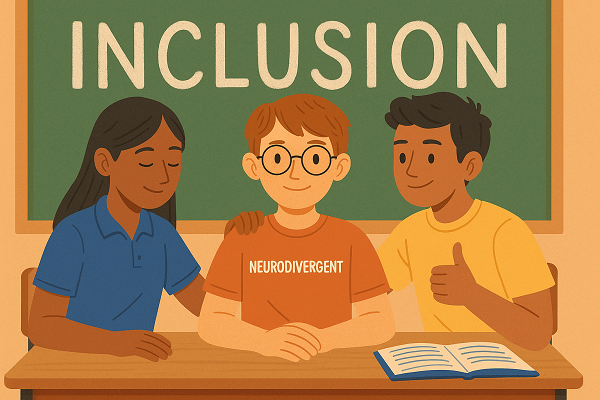
Aamir Khan’s recent film Sitaare Zameen Par has brought neurodiversity into the mainstream, and sparked important conversations about inclusion and rethinking what we consider ‘normal’. These cultural moments help raise awareness, but they also remind us that there is still a long way to go in making inclusion a lived reality.
It is estimated that 1 in 8 children in India have a neurodevelopmental condition such as ADHD, autism, learning disabilities and intellectual disability. Many of these children often face social isolation, bullying and exclusion – often the earliest of these experiences begin during school.
At the same time, today’s young people indeed carry with them a deep sense of social justice and openness to diversity. The energy, empathy and bold creativity of young people can be harnessed – if nurtured in the right way, at the right time – to make them equal partners in cultivating inclusive cultures in schools and communities.
We need young allies – people who are not only informed, but who engage meaningfully with neurodivergent peers, actively support the cause, and drive inclusivity. The key lies in equipping them with the knowledge, skills, and ultimately the mindset needed for inclusion. Schools must invest in nurturing young allies who can champion neurodiversity and take ownership of inclusion in spaces they belong to.
Our experience and work on youth allyship has shaped our understanding of what it takes to make this happen. Here are some of our most important insights:
- From awareness to active allyship: We need to move beyond awareness about neurodiversity, by equipping students with the knowledge, skills, confidence, and opportunities to take meaningful action as allies for neuro-inclusion.
- A personalised journey: Allyship is a lifelong journey which is most authentic when it grows organically from curiosity, dialogue, self-initiative and experiences. It cannot be imposed, and must be led by the individual.
- Student autonomy: When students have the autonomy to choose how they contribute, their commitment deepens. We should give students a mix of structure and freedom to help – guidance to shape their efforts, alongside the space to decide how they want to step up for meaningful change.
So how can schools nurture students as young allies?
- Create safe, relatable spaces led by students, for students Peer-led conversations give students space to reflect on diversity, challenge stereotypes, and share personal experiences. When peers lead, the power dynamics shift – students listen more openly, express without fear of judgment, and begin to see inclusion as something that belongs to them, not just a directive from authority figures. Our Inclusive Duniya Circles are one example of such spaces. Students are primed and empowered to sensitively facilitate conversations about disability, neurodiversity and inclusion.
- Explore connections to students’ interests and strengths
Students should be given the opportunity to discover how they feel about the cause and how they want to contribute. At the end of each Circle, we often ask, “How do you want to step up for an Inclusive Duniya?” The answers vary, but what matters most is that the initiative comes from the students themselves. Our role as adults and educators is to support them in making it happen.
Some take the route of advocacy – sparking conversations and campaigning for the cause with schoolmates. Others channel creativity through music, art, or theatre that challenges stereotypes.
For instance, the song Inclusive Duniya (available on Spotify), was written, composed and produced by students on their own from carefully crafting lyrics which invited listeners to imagine a world where everyone feels like they belong to picking melodies that convey warmth. Students used their creative talents to make a gentle but compelling call to action for allyship. Helping students tap into their personal strengths and interests enables authentic engagement and contribution to the cause.
- Embed into academic and co-curricular pathways
Linking students’ inclusion initiatives and projects to existing academic opportunities, such as CAS projects in the IB curriculum, allows them to merge personal passion with academic commitment. Framing these initiatives as co-curricular activities also strengthens students’ profiles for college applications. This dual recognition provides a formal recognition to their efforts and ensures students’ efforts are sustained – adding motivation, depth and commitment to their efforts.
The voices of young people not only impact their peers, but also have a ripple effect in shaping how families talk about disabilities, and, in due course, how communities and workplaces open themselves up to inclusion.
With the right support, our young generation can become a driving force for an inclusive world. Schools, as microcosms of society, provide the most conducive space for young people to explore sensitive concepts, question biases, and practice inclusion in meaningful ways. By nurturing young allies who truly value and celebrate diverse ways of thinking and being, we can lay the foundation for a more Inclusive Duniya.
This article is co-authored by:

Pooja Sharma, Founder and CEO, Inclusive Duniya
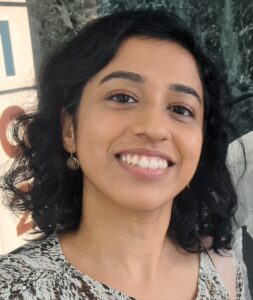
Srushti Patel, Manager- Schools Programme, Inclusive Duniya
Education
Ministry of Education Urges Schools to Adopt UPI for Digital Fee Payments, Promoting Ease of Schooling

-

 Education3 months ago
Education3 months agoDharav Utsav to Celebrate Rajasthan’s Cultural Heritage and Local Talent
-

 Education3 months ago
Education3 months agoAI to Become a Core Subject from Class 3: India’s Big Leap Toward a Future-Ready Generation
-

 Education3 months ago
Education3 months agoHow to Build Better Parent-Teacher Communication
-

 Inspiration2 months ago
Inspiration2 months agoUmeed: A Ray of Hope for Better Tomorrow
-

 Knowledge2 weeks ago
Knowledge2 weeks agoBuilding a Healthier India: Why School Health Programs Are Essential
-

 Education2 weeks ago
Education2 weeks agoWhat the Indian Army Teaches Our Children Beyond Textbooks
-

 Inspiration2 weeks ago
Inspiration2 weeks agoBefore the Nobel, There Was a Teacher
-

 News6 days ago
News6 days agoInclusive Education Summit 2026: Designing the Future of “Learner-Centric” Education









